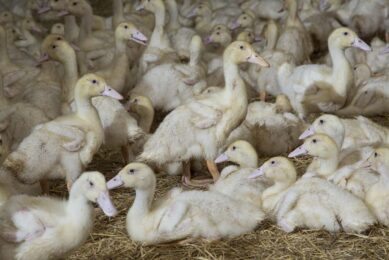UPDATE: Prayer bird concerns over H5N1 in Hong Kong
Six scaly-breasted munias, a popular species of “prayer birds” used for release in Buddhist rituals to enhance a devotee’s karma, were found dead in a busy shopping area, including one which tested positive for the H5N1 virus.
Prayer bird species range from munias, Japanese white-eye, white-rumped munia and tree sparrows costing as little as HK$4 (US$0.50) each, to the more expensive azure-winged magpies and Mongolian larks, are imported from China. The prayer birds are released en masse at Buddhist religious rites, and could spread bird flu to poultry, experts say.
“We really have to seriously consider this possibility of prayer bird infection,” said Malik Peiris, a virologist and leading bird flu expert at the University of Hong Kong. “In Hong Kong, there is no H5N1 activity in poultry. So for this bird that was found dead, the question is how it got infected?”
While the Hong Kong government tightly regulates poultry imports, laws for wild bird imports are much more lax, making it a potential crack in the city’s bird flu defences. The territory had recently banned imports of poultry from Japan after a fresh outbreak of bird flu there.
Richard Corlett, a professor of ecology at the University of Hong Kong, said the trade in wild birds was on a much larger scale than previously thought, with at least half a million birds freed by Buddhists in 2005, sometimes thousands at a time.
Hong Kong’s concerns come as the European Union passed new laws banning imports of wild birds on health and animal welfare grounds, a move which Corlett said the Hong Kong government should follow.
“There’s a great deal of reluctance to acknowledge this is a problem … You can go and buy 10,000 budgerigars and release them in a country park and there’s nothing to stop you doing that,” Corlett said.
The government has not said whether it would consider a ban on wild bird imports but has urged Buddhist organizations not to release such birds in future.
Related articles:
Dead wild bird in Hong Kong tests positive
EU ban on wild bird imports won’t stop bird flu
Join 31,000+ subscribers
Subscribe to our newsletter to stay updated about all the need-to-know content in the poultry sector, three times a week. Beheer
Beheer








 WP Admin
WP Admin  Bewerk bericht
Bewerk bericht